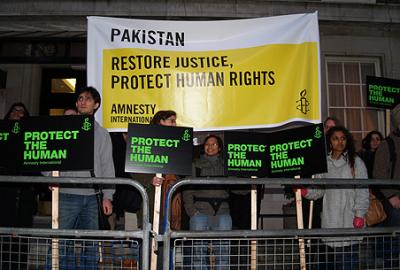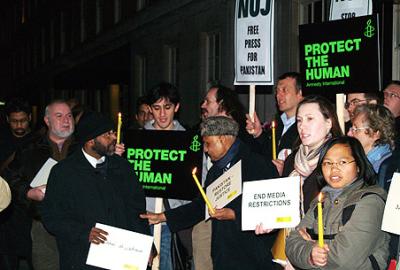... newer stories
Freitag, 7. Dezember 2007
Post-Nikolaus
fridax, 12:49h
Besinnlichkeit, Adventszeit, Weihnachtszeit, Jahresende.
Im Land der guten Manieren ist herzlich wenig vom Feste zu spüren.
Man muss schon genauer hinsehen, wenn man Lametta am Baum finden will. Angenehmerweise bleibt man von Weihnachtsklängen im Kaufhaus ebenso verschont... Der Nachteil: der Schnee ist eh von gestern, die Stimmung auch und nach der dritten Weihnachtsfeier in Folge wünscht man sich gar den Osterhasen herbei.
Gestern lief 'The Prince of Egypt' im britischen Fernsehen und ich hätte ob der heimeligen Disney Adaption gerne mal den Inquisitor einbestellt. Was bewegt eigentlich die Filmindustrie dazu, aus der Figur des Moses jedweden Funken Berufung und, ja, Wundersamkeit auszumerzen, um ihn auf eine Reise zu sich selbst zu schicken? Eine sehr moderne Reise wohlgemerkt.
Gott sprach zu Mose: Weil denn nun das Geschrei der Israeliten vor mich gekommen ist und ich dazu ihre Not gesehen habe, wie die Ägypter sie bedrängen, so geh nun hin, ich will dich zum Pharao senden, damit du mein Volk, die Israeliten, aus Ägypten führst. Exodus, Kap. 3, 9-10
Freiheit von Unterdrückung... Der Auszug aus Ägypten ist ein Meilenstein in der jahrtausendelangen Tortur, die folgen wird, um das Land zu proklamieren, wo Milch und Honig fließen.
Im Land der guten Manieren ist herzlich wenig vom Feste zu spüren.
Man muss schon genauer hinsehen, wenn man Lametta am Baum finden will. Angenehmerweise bleibt man von Weihnachtsklängen im Kaufhaus ebenso verschont... Der Nachteil: der Schnee ist eh von gestern, die Stimmung auch und nach der dritten Weihnachtsfeier in Folge wünscht man sich gar den Osterhasen herbei.
Gestern lief 'The Prince of Egypt' im britischen Fernsehen und ich hätte ob der heimeligen Disney Adaption gerne mal den Inquisitor einbestellt. Was bewegt eigentlich die Filmindustrie dazu, aus der Figur des Moses jedweden Funken Berufung und, ja, Wundersamkeit auszumerzen, um ihn auf eine Reise zu sich selbst zu schicken? Eine sehr moderne Reise wohlgemerkt.
Gott sprach zu Mose: Weil denn nun das Geschrei der Israeliten vor mich gekommen ist und ich dazu ihre Not gesehen habe, wie die Ägypter sie bedrängen, so geh nun hin, ich will dich zum Pharao senden, damit du mein Volk, die Israeliten, aus Ägypten führst. Exodus, Kap. 3, 9-10
Freiheit von Unterdrückung... Der Auszug aus Ägypten ist ein Meilenstein in der jahrtausendelangen Tortur, die folgen wird, um das Land zu proklamieren, wo Milch und Honig fließen.
... link (0 Kommentare) ... comment
Dienstag, 27. November 2007
The rediscovery of discretion
fridax, 00:21h
// Was bedeutet eigentlich Privatsphäre in Zeiten von Facebook und Kiezkollegen? Wer liest mit und wieso ist Generation "Y" so versessen auf Omnipräsenz im Netz? Tatsächlich ist auch bei der Prä-SMS Generation, laut Economist Artikel, das Bedürfnis groß, online soziale Netzwerke zu knüpfen... //
Older people, too, will extend their social networks online without feeling awkward, says Andreas Kluth
For the first 200 millennia of the species, human social networks remained technologically stable. People sat around campfires, told stories and cultivated connections. Literacy and letters, and later the telephone, helped to extend these across distance. But the trickiest part involved figuring out the right balance between divulging too much or too little to the network, and between coming on too strongly or too coyly in requesting new friendships, copulations and alliances.
Then, during the first decade of the 21st century, the internet briefly promised to solve these conundrums by breeding online social networks—with names such as MySpace and Facebook—that appealed to the fragile psyches of one generation, nicknamed “Y”, while mystifying or horrifying the preceding generation, called “X”.
What drew the Ys was the sheer scalability of the medium (yielding enormous efficiency gains when prowling for dates), its suitability for self-marketing (with photos of bacchanalia, say, to advertise popularity) and above all the temporary reprieve from the awkwardness that comes with “friending” in real life. The old conundrums around discretion seemed technologically obsolete. What mystified, then horrified, the Xs, who often arrived on these networks as inquisitive parents of the Ys, were those same features. Don’t these kids realise that potential employers can see this stuff? And what happens emotionally to my daughter when her boyfriend breaks up by simply toggling his online status to “Single” or “It’s complicated”?
In 2007 things got more complicated for the Xs. Thanks to Facebook, many middle-aged office types were expected to join in. But there was no rule-book for how to reject the “friend” request of a boss, or whether doing so was permissible at all. If not, should he be allowed to see the naked baby photos? While some Ys became more cautious after their excesses in 2006, many Xs began squirming in new forms of awkwardness in 2007.
This will change in 2008, as social-networking technology changes to fit human nature, rather than forcing human nature to fit the technology. The industry leaders in 2007 were really old-fashioned “walled gardens”. They came in generic templates, with the crucial sociological aspects—what sort of information to give on a profile, for instance—pre-determined by programmers. Yes, they allowed users to customise their start pages, but so did the walled gardens of the early 1990s, online services such as AOL or CompuServe.
Those closed services crumbled and gave rise, after the Netscape browser and its emulators made it possible, to the open and polyvalent web. The same thing will happen in 2008 in the world of social networks. In place of today’s walled gardens of awkwardness, open toolkits will arise to allow anybody, with a few simple clicks, to create his or her own social network, which will be an extension of existing connections in real life.
Anyone for yoga?
One example is Ning, a provider of just such networking tools (co-founded, as it happens, by Marc Andreessen, who once built Netscape). Using Ning’s tools a mother, say, can start a social network with other mums to schedule playgroups for the kids—by inviting the other mums, while making the whole thing private for security against stalkers. If she also likes yoga, she can start another network, with photos, videos and reviews of yoga studios. And so on.
The point is that the uses of these networks are for the users to decide. Once reassured of this, people will then not so much “join” new networks as “log on” to their existing human networks around hobbies and other passions. It will be like sitting around campfires again, only now with vastly superior tools for sharing, bonding and planning. As for the old dilemmas between telling all or too little, between making friends wisely or not, 2008 will offer no progress at all.
Andreas Kluth: San Francisco correspondent, The Economist
// From The World in 2008 print edition of The Economist //
Older people, too, will extend their social networks online without feeling awkward, says Andreas Kluth
For the first 200 millennia of the species, human social networks remained technologically stable. People sat around campfires, told stories and cultivated connections. Literacy and letters, and later the telephone, helped to extend these across distance. But the trickiest part involved figuring out the right balance between divulging too much or too little to the network, and between coming on too strongly or too coyly in requesting new friendships, copulations and alliances.
Then, during the first decade of the 21st century, the internet briefly promised to solve these conundrums by breeding online social networks—with names such as MySpace and Facebook—that appealed to the fragile psyches of one generation, nicknamed “Y”, while mystifying or horrifying the preceding generation, called “X”.
What drew the Ys was the sheer scalability of the medium (yielding enormous efficiency gains when prowling for dates), its suitability for self-marketing (with photos of bacchanalia, say, to advertise popularity) and above all the temporary reprieve from the awkwardness that comes with “friending” in real life. The old conundrums around discretion seemed technologically obsolete. What mystified, then horrified, the Xs, who often arrived on these networks as inquisitive parents of the Ys, were those same features. Don’t these kids realise that potential employers can see this stuff? And what happens emotionally to my daughter when her boyfriend breaks up by simply toggling his online status to “Single” or “It’s complicated”?
In 2007 things got more complicated for the Xs. Thanks to Facebook, many middle-aged office types were expected to join in. But there was no rule-book for how to reject the “friend” request of a boss, or whether doing so was permissible at all. If not, should he be allowed to see the naked baby photos? While some Ys became more cautious after their excesses in 2006, many Xs began squirming in new forms of awkwardness in 2007.
This will change in 2008, as social-networking technology changes to fit human nature, rather than forcing human nature to fit the technology. The industry leaders in 2007 were really old-fashioned “walled gardens”. They came in generic templates, with the crucial sociological aspects—what sort of information to give on a profile, for instance—pre-determined by programmers. Yes, they allowed users to customise their start pages, but so did the walled gardens of the early 1990s, online services such as AOL or CompuServe.
Those closed services crumbled and gave rise, after the Netscape browser and its emulators made it possible, to the open and polyvalent web. The same thing will happen in 2008 in the world of social networks. In place of today’s walled gardens of awkwardness, open toolkits will arise to allow anybody, with a few simple clicks, to create his or her own social network, which will be an extension of existing connections in real life.
Anyone for yoga?
One example is Ning, a provider of just such networking tools (co-founded, as it happens, by Marc Andreessen, who once built Netscape). Using Ning’s tools a mother, say, can start a social network with other mums to schedule playgroups for the kids—by inviting the other mums, while making the whole thing private for security against stalkers. If she also likes yoga, she can start another network, with photos, videos and reviews of yoga studios. And so on.
The point is that the uses of these networks are for the users to decide. Once reassured of this, people will then not so much “join” new networks as “log on” to their existing human networks around hobbies and other passions. It will be like sitting around campfires again, only now with vastly superior tools for sharing, bonding and planning. As for the old dilemmas between telling all or too little, between making friends wisely or not, 2008 will offer no progress at all.
Andreas Kluth: San Francisco correspondent, The Economist
// From The World in 2008 print edition of The Economist //
... link (0 Kommentare) ... comment
Sonntag, 25. November 2007
Baked Beans 

fridax, 14:35h
Jam Circus, ein Sonntag im November
Ich drücke mir selbst die Daumen, dass die Internetverbindung dieses Mal stabil bleibt und ich diesen ersten Eintrag im Blog beenden kann.
Wie ich ein ums andere Mal bemerkt habe, ist London abgesehen von seiner Megalomania, seinem Kultstatus, seiner Diversität weit entfernt von den Standards, die ich in DE zu schätzen gelernt habe. An die ich mich gewöhnt habe, die mir das Leben erleichtert haben... *
Sozialer Habitus, so langsam schwant mir, warum jene Schichten meiner Persönlichkeitsstruktur in der Fremde gehörig auf die Probe gestellt werden.
Wie, gibts nix Positives zu berichten? Bitte! Ich befinde mich im Wunderland, wo Bücher zum Thema 'The art of complaining' publiziert werden. Aber in der Tat, es gibt erklecklich Positives zu sagen: die ersten Wochen seit meiner Ankunft waren erfüllt von Cider ;), Joggen (das Wetter ist plötzlich so übel geworden, da kann man wirklich nix machen außer aufhören...), generelll ankommen (getting used to everything and everyone). Nach anfänglichen Irritationen auf der Arbeit (Akronymalarm, meine Chefs waren tagelang abwesend, professionelles Arbeiten, speaking English not like a Kartoffel) habe ich das gute Gefühl, dass ich nicht fehl am Platz bin.
// http://web.amnesty.org/pages/pak-161107-feature-eng // (Slideshow, Video, message)

(c) AI

(c) AI
Aktivismus war für mich bislang eigentlich eher ein Fremdwort.
Auf einem Meeting unseres Clusters (International Mobilization Unit oder so... manchmal weiß ich wirklich, wer zu wem gehört) hat die Moderatorin die eindrückliche Frage gestellt, vielleicht ist es sogar ein Affront: what impact does your work have on other people's lives?
In diesem Sinne habe ich bei ver(w)irrten Lesern zumindest für die Zeitspanne von 0.03 Sek. Eindruck hinterlassen. Genug, um von Zeit zu Zeit zu diesem Blog zurückzukehren. (Und damit meine ich DICH :)
R.
---
* Saftiges, vor Körnern strotzendes Toastbrot; permanente Erreichbarkeit überall und jederzeit; durchschaubares Bezahlsystem bei den öffentlichen Verkehrsmitteln, überhaupt kein kulturelles Angebot (hehehe), die Nähe und Gesellschaft von Gleichgesinnten (im Fachjargon auch Freunde genannt); die Deutsche Mark...
Ich drücke mir selbst die Daumen, dass die Internetverbindung dieses Mal stabil bleibt und ich diesen ersten Eintrag im Blog beenden kann.
Wie ich ein ums andere Mal bemerkt habe, ist London abgesehen von seiner Megalomania, seinem Kultstatus, seiner Diversität weit entfernt von den Standards, die ich in DE zu schätzen gelernt habe. An die ich mich gewöhnt habe, die mir das Leben erleichtert haben... *
Sozialer Habitus, so langsam schwant mir, warum jene Schichten meiner Persönlichkeitsstruktur in der Fremde gehörig auf die Probe gestellt werden.
Wie, gibts nix Positives zu berichten? Bitte! Ich befinde mich im Wunderland, wo Bücher zum Thema 'The art of complaining' publiziert werden. Aber in der Tat, es gibt erklecklich Positives zu sagen: die ersten Wochen seit meiner Ankunft waren erfüllt von Cider ;), Joggen (das Wetter ist plötzlich so übel geworden, da kann man wirklich nix machen außer aufhören...), generelll ankommen (getting used to everything and everyone). Nach anfänglichen Irritationen auf der Arbeit (Akronymalarm, meine Chefs waren tagelang abwesend, professionelles Arbeiten, speaking English not like a Kartoffel) habe ich das gute Gefühl, dass ich nicht fehl am Platz bin.
// http://web.amnesty.org/pages/pak-161107-feature-eng // (Slideshow, Video, message)

(c) AI

(c) AI
Aktivismus war für mich bislang eigentlich eher ein Fremdwort.
Auf einem Meeting unseres Clusters (International Mobilization Unit oder so... manchmal weiß ich wirklich, wer zu wem gehört) hat die Moderatorin die eindrückliche Frage gestellt, vielleicht ist es sogar ein Affront: what impact does your work have on other people's lives?
In diesem Sinne habe ich bei ver(w)irrten Lesern zumindest für die Zeitspanne von 0.03 Sek. Eindruck hinterlassen. Genug, um von Zeit zu Zeit zu diesem Blog zurückzukehren. (Und damit meine ich DICH :)
R.
---
* Saftiges, vor Körnern strotzendes Toastbrot; permanente Erreichbarkeit überall und jederzeit; durchschaubares Bezahlsystem bei den öffentlichen Verkehrsmitteln, überhaupt kein kulturelles Angebot (hehehe), die Nähe und Gesellschaft von Gleichgesinnten (im Fachjargon auch Freunde genannt); die Deutsche Mark...
... link (0 Kommentare) ... comment
